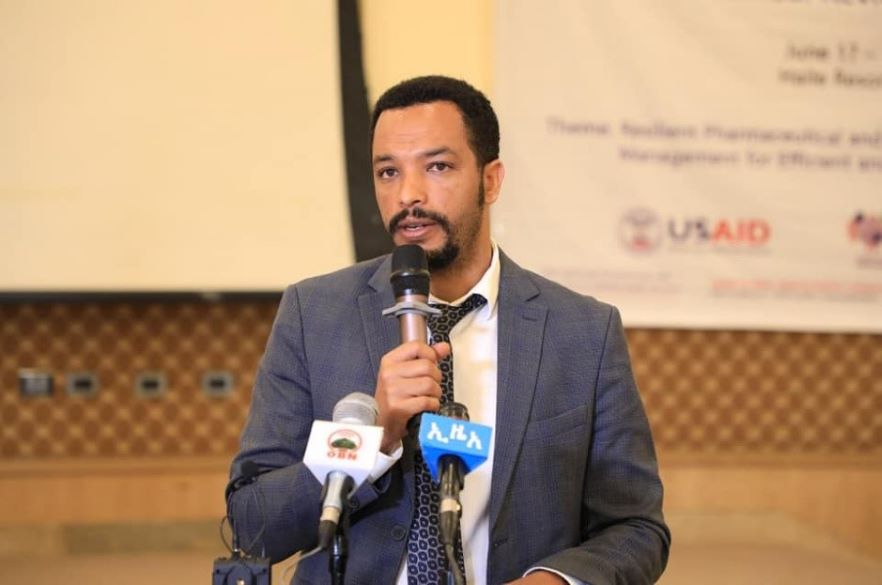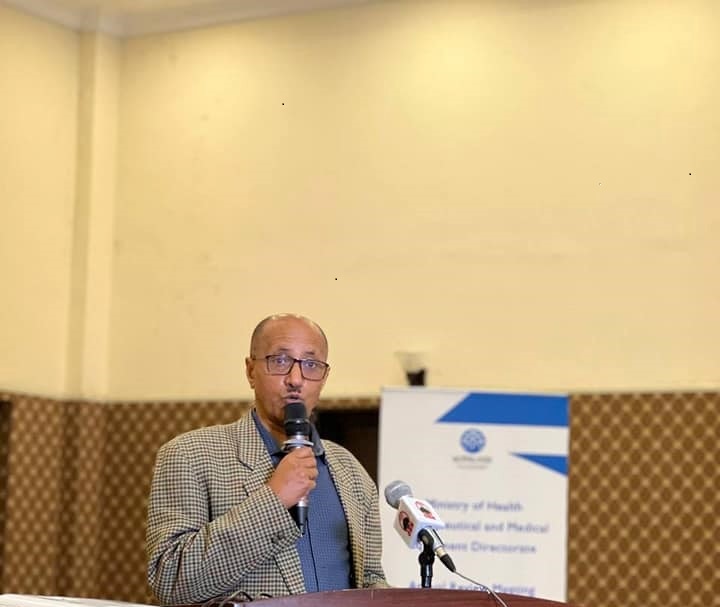Ethiopian Ministry of Health Addresses AMR Agenda
The USAID MTaPS Program and Ethiopia’s Pharmaceutical and Medical Equipment Directorate of the Ministry of Health (PMED/MOH) share a common goal of ensuring the uninterrupted supply of safe, effective, and affordable medicines and medical devices, including antimicrobials, and promoting rational use of these products.
On June 17-19, 2022, MTaPS supported the PMED annual review and consultative meetings held in Adama, Ethiopia, under the theme, “Resilient pharmaceutical and medical device supply management for efficient and effective emergency response.” More than 135 participants and high-level officials and representatives attended, drawn from different directorates and agencies of MOH, regional health bureaus, hospitals, and international development partners.

State Minister of Health Dr. Derege Duguma gives his remarks
In his opening remarks, the State Minister of Health, Dr. Derege Duguma, highlighted that access to pharmaceutical and medical devices is one of the key priorities of the MOH to ensure a proper response to global and national emergencies, underscored by MOH’s tremendous efforts to develop COVID-19 prevention and treatment capacities, strengthen oxygen supplies, and improve access to essential health products. He emphasized the importance of product availability and accessibility, saying,
“There is no program without product.”
Going beyond access to ensuring proper use, MOH designed several initiatives, such as Auditable Pharmaceutical Transaction and Services and clinical pharmacy services, to promote proper use, including of antimicrobials. MOH has a robust AMR prevention and containment agenda, based on the One Health approach, with interventions designed and implemented with MTaPS’ support. Dr. Duguma reminded all stakeholders and partners to prioritize AMR issues and incorporate AMR prevention and containment activities in their plans.

Keynote address by MTaPS’ Mr. Workineh Getahun
Mr. Workineh Getahun, Senior Technical Advisor, USAID-MTaPS, delivered a keynote address, highlighting the contributions of MTaPS’ technical and financial support to the country’s efforts in combating AMR. MTaPS supported strengthening AMR governance by restructuring its framework and reestablishing the national One Health AMR advisory committee and two technical working groups (antimicrobial stewardship [AMS] and infection prevention and control [IPC] technical working groups). Further, the program assisted with updating the national AMR strategic plan, standard treatment guidelines, and essential medicines list and developing tools and training packages on IPC and AMS. Aside from national interventions, MTaPS has been working at the health facility level supporting assessments on IPC and AMS, and building staff capacities for monitoring and improving IPC and AMS. He concluded his remarks by underlining that USAID MTaPS will continue working with the Ethiopian government and other stakeholders in the fight against AMR.
The overarching agenda covered the annual performance review, research, and innovations, with presentations from PMED and regional health bureaus; the presentations included the AMS program, the prevalence of AMR and its clinical implications, and lessons learned.
The event created a platform for PMED and USAID MTaPS to meet the regional AMR focal persons and discuss cascading the national-level AMR prevention and containment efforts to regions and facilities. As a result of the discussions, the parties will organize regional events in coordination with partners and stakeholders.
Ethiopia is one of 13 countries MTaPS is working with to build national capacities to contain AMR under the Global Health Security Agenda.